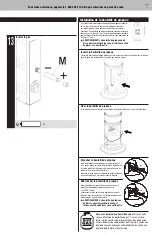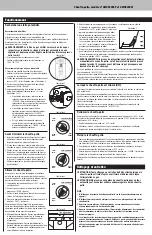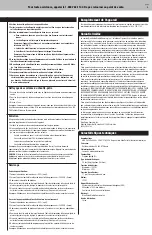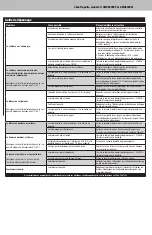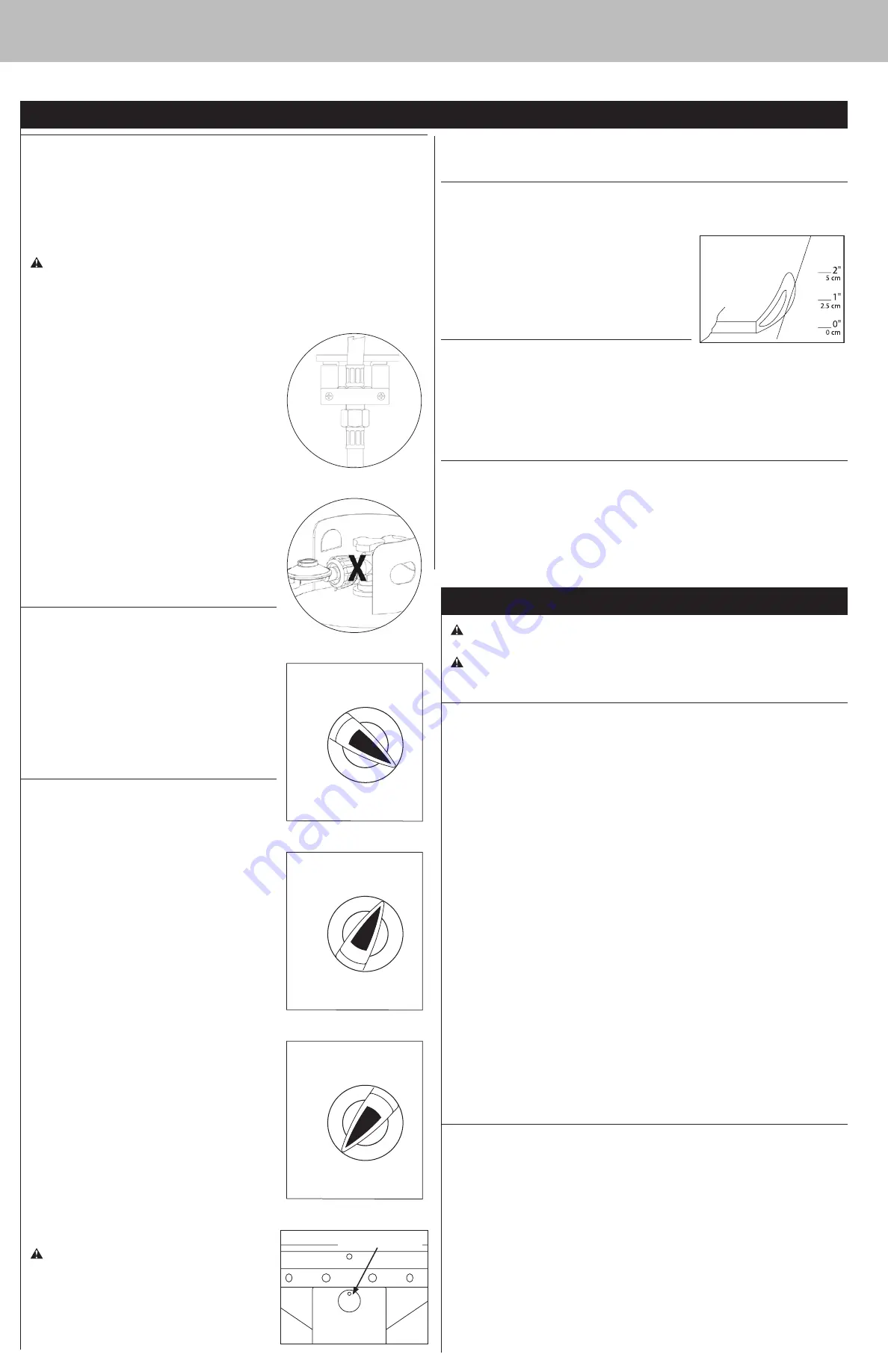
Outdoor Patio Heater Model No. GWU9209SP & GWU9209W
Contact 1.800.762.1142 for assistance. Do not return to place of purchase.
Checking for Leaks
Burner Connections
1. Make sure the regulator valve and hose connections are securely fastened to the burner and
the tank.
2. If your unit was assembled for you, visually check the connection between the burner pipe
and orifice. Make sure the burner pipe fits over the orifice.
WARNING: Failure to inspect this connection or follow these
instructions could cause a fire or an explosion which can cause death,
serious bodily injury, or damage to property.
3. If the burner pipe does not rest flush to the orifice,
please contact 1.800.762.1142 for assistance.
Tank/Gas Line Connection
1. Make 2-3 oz. of leak solution by mixing one part liquid
dishwashing soap with three parts water.
2. Make sure control knob is in “OFF” position. (Figure 3)
3. Turn LP gas tank valve to “OPEN”.
4. Spoon leak check solution at all “X” locations.
(Figures 1 and 2)
a. If any bubbles appear turn LP gas tank valve to
“CLOSED”, reconnect and re-test.
b. If you continue to see bubbles after several
attempts, turn LP gas tank valve to “CLOSED”,
disconnect LP gas tank and contact
1.800.762.1142 for assistance.
b. If no bubbles appear after one minute turn LP gas
tank valve to “CLOSED”, wipe away solution and
proceed.
Before Lighting
1. Heater should be thoroughly inspected before each use,
and by a qualified service person at least annually.
2. If relighting a hot heater, always wait at least
5 minutes.
3. Inspect the hose assembly for evidence of excessive
abrasion, cuts or wear. Suspected areas should be
leak tested. If the hose leaks, it must be replaced prior
to operation. Only use the replacement hose assembly
specified by manufacturer.
Lighting
Note:
This heater is equipped with a pilot light that allows
for safer startups and shutdowns. Pilot must be lit before
main burner can be started.
1. Control knob must be in the “OFF” position. (Figure 3)
2. Turn LP gas tank valve to “OPEN”.
3. Open viewing hole by sliding cover to either side.
(Figure 6)
4. Push control knob in and rotate to “PILOT” position.
(Figure 4)
Note:
For initial start or after any tank change, hold control
knob in for 2 minutes to purge air from gas lines before
proceeding.
5.
Push-button Ignition
: Immediately push igniter button
a couple of times. Pilot light flame will appear and be
visible through viewing hole.
Electronic Ignition
: Immediately push igniter button for
five (5) seconds. Pilot light flame will appear and be
visible through viewing hole.
6. Release control knob after 30 seconds. Pilot light will
remain lit.
7. If ignition does not occur, turn control knob “OFF”, wait 5
minutes and repeat lighting procedure.
8. Turn control knob to “HIGH”. (Figure 5) Main burner will
light immediately. Flame is visible through viewing hole.
If not, turn control knob “OFF”, wait 5 minutes, and
repeat lighting procedure.
9. If for some reason your ignitor fails to deliver a spark,
your heater can be started by inserting a lit match
through the pilot view hole while pushing the control
knob in while in the “PILOT” position.
WARNING: Be careful when attempting to
manually ignite this heater. Holding in the
control knob for more than 10 seconds
before igniting the gas will cause a ball of
flame upon ignition.
Have a question or are having problems visit
www.bluerhino.com or call 1.800.762.1142.
Note:
The burner may be noisy when initially turned on. To eliminate excessive noise from the
burner turn the control knob to the pilot position, then turn the knob to the level of heat desired.
When heater is ON:
Emitter screen will become bright red due to intense heat. The color is more visible at night.
Burner will display tongues of blue and yellow flame.
These flames should not be yellow or produce thick black
smoke, indicating an obstruction of airflow through the
burners. The flame should be blue with straight yellow
tops. (Figure 7)
If excessive yellow flame is detected, turn off heater and
visit www.bluerhino.com or call 1.800.762.1142.
Re-lighting
Note:
For your safety, control knob cannot be turned “OFF” without first depressing control
knob in PILOT position and then rotating it to “OFF”.
1. Turn control knob to “OFF”.
2. Wait at least 5 minutes to let gas dissipate.
3. Repeat the “Lighting” procedure.
Shut Down
1. Turn control knob clockwise to pilot. (Normally, burner will make a slight popping sound when
extinguished.) Burner will extinguish but pilot will remain “ON”.
2. To extinguish pilot, depress control knob and continue to turn it clockwise to “OFF”.
3. Turn tank valve to “CLOSED” and disconnect regulator when heater is not in use.
Note: After use, some discoloration of the emitter screen is normal.
Cleaning and Care
CAUTION: All cleaning and maintenance should be done when patio
heater is cool and with the fuel supply disconnected.
CAUTION: DO NOT clean any patio heater part in a self cleaning oven.
The extreme heat will damage the finish.
Notices
1. This heater should be thoroughly cleaned on a regular basis.
2. Abrasive cleaners will damage this product.
3. Never use oven cleaner to clean any part of heater.
4. More frequent cleaning may be required as necessary. It is imperative that control
compartment, burners and circulating air passageways of the heater be kept clean.
5. Have heater inspected annually and repairs should be made by a qualified service
person.
6. Inspect heater before each use.
7. Spiders and insects can create a dangerous condition that may damage the heater or
make it unsafe. Keep burner area clean of all spiders, webs and insects. Clean burner
holes by using a heavy-duty pipe cleaner. Compressed air may help clear away smaller
particles.
8. Check heater immediately if any of the following conditions exist:
a. The smell of gas in conjunction with extreme yellow tipping of burner flames.
b. Heater does not reach proper temperature.
Note: At temperatures less than 40ºF, heat output will be reduced.
c. Heater’s glow is excessively uneven
d. Burner makes popping noises during use.
Note: A slight pop is normal when burner is extinguished.
9. Carbon deposits may create a fire hazard. Keep dome and emitter clean at all times.
10. Do not clean heater with combustible or corrosive cleaners. Use warm, soapy water.
11. Do not paint engine, engine access panel or dome.
13. After a period of storage and/or nonuse, check for leaks, burner obstructions and
inspect for any abrasion, wear or cuts to the hose.
Cleaning Surfaces
1. Wipe surfaces clean with mild dishwashing detergent or baking soda.
2. For stubborn surfaces use a citrus based degreaser and a nylon scrubbing brush.
3. Rinse clean with water.
Note:
While cleaning your unit, be sure to keep the area around the burner and pilot assembly
dry at all times. Do not submerge the control valve assembly. If the gas control is submerged in
water, do NOT use it. It must be replaced.
Figure 7
Figure 1
X
Figure 2
Figure 3
PILOT / PILOTO
push in / presione y
mantenga presionado
LOW /
BAJO
HIGH /
ALTO
OFF /
APAGADO
Figure 4
PILOT / PILOTO
push in / presione y
mantenga presionado
LOW /
BAJO
HIGH /
ALTO
OFF /
APAGADO
Figure 5
PILOT / PILOTO
push in / presione y
mantenga presionado
LOW /
BAJO
HIGH /
ALTO
OFF /
APAGADO
Figure 6
View Hole
Operating Instructions

















